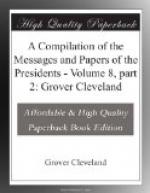There are other causes that deter me from giving this bill the sanction of my approval. The judgment of the court-martial by which more than twenty years since General Fitz John Porter was tried and convicted was pronounced by a tribunal composed of nine general officers of distinguished character and ability. Its investigation of the charges of which it found the accused guilty was thorough and conscientious, and its findings and sentence were in due course of law approved by Abraham Lincoln, then President of the United States. Its legal competency, its jurisdiction of the accused and of the subject of the accusation, and the substantial regularity of all of its proceedings are matters which have never been brought into question. Its judgment, therefore, is final and conclusive in its character.
The Supreme Court of the United States has recently declared that a court-martial such as this was is the organism provided by law and clothed with the duty of administering justice in this class of cases. Its judgments, when approved, rest on the same basis and are surrounded by the same considerations which give conclusiveness to the judgments of other legal tribunals, including as well the lowest as the highest. It follows, accordingly, that when a lawfully constituted court-martial has duly declared its findings and its sentence and the same have been duly approved neither the President nor the Congress has any power to set them aside. The existence of such power is not openly asserted, nor perhaps is it necessarily implied, in the provisions of the bill which is before me, but when its enacting clauses are read in the light of the recitations of its preamble it will be seen that it seeks in effect the practical annulment of the findings and the sentence of a competent court-martial.
A conclusion at variance with these findings has been reached after investigation by a board consisting of three officers of the Army. This board was not created in pursuance of any statutory authority and was powerless to compel the attendance of witnesses or to pronounce a judgment which could have been lawfully enforced. The officers who constituted it, in their report to the Secretary of War, dated March 19, 1879, state that in their opinion—




